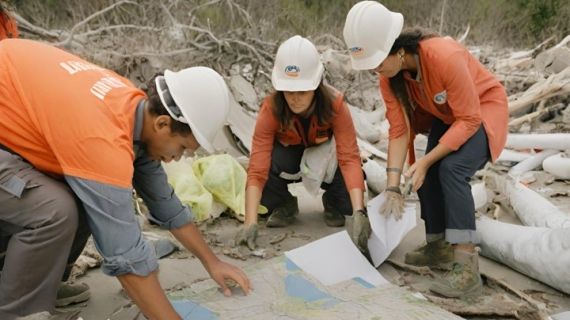
What can I expect from the Horizon Scanning Resilience and Emergencies Planning Webinar?
Breadcrumb
The horizon scanning webinar is aimed at those that manage and mitigate emergency responses on behalf of organisations – with job titles potentially including Fire Safety Officer; Health and Safety Environment Executive, Health and Safety Environment Officer, Senior Business Resilience Manager; Flood Resilience Officer or Humanitarian Response Executive. The 2-hour webinar will be hosted by Gail Rowntree, Beverley Griffiths and Stephanie Buller from BNU’s Centre for Intelligence, Security and Resilience and provides subject expert insight utilising recent disaster and emergency response case study.
Horizon scanning refers to the process of identifying and monitoring emerging trends, risks, and opportunities that may impact an organisation, industry, or society in the future. It involves actively seeking out signals, weak signals, and early indicators from various sources such as scientific research, technological advancements, geopolitical developments, and social changes. The goal is to anticipate potential disruptions, challenges, or breakthroughs and proactively prepare for them.
In the instance of Resilience and Emergencies Planning its also about applying lessons learned from previous events. Whilst many emergencies can’t be foretold, the competence and confidence of the individuals and teams that plan, govern and deploy the response can dramatically alter an event’s impact both on those directly involved and the wider public perception.
For this Horizon Scanning event, the academic team will examine three recent events and responses to; a residential fire in Valencia; a terrorist attack in Manchester and; a neighbourhood evacuation in Plymouth. A final session will look at how organisations responsible for coordinating responses to events manage their brand reputation in the context of preparedness and response to future events.
Meet the Webinar Host – Gail Rowntree MSc (OPP), PGCLTHE, SFHEA, MEPS
Gail Rowntree is the Programme Lead for the new Resilience and Emergencies Professional Apprenticeship. Before joining BNU in 2020 (having previously worked for the University between 2010 and 2016), she was Vice President of Humanitarian Response, Training and Planning for a mass fatality disaster organisation. She has worked in aviation crisis management for 20 years since leaving British Airways as Cabin Crew. Gail has responded to 36 international incidents for a variety of employers and clients as a First Responder. We asked her a few questions about her career and career advice for resilience and emergencies professionals.
I started out as cabin crew with British Airways and then moved into the Safety Team. This sparked my passion for aviation crisis and emergency management, and I moved to a commercial organisation in 2004 as Vice President of Training and Family Assistance travelling the world from disaster to disaster. Usually as Senior Incident Director and/or Head of Mental Health Team. I was part of the senior teams that responded to, and organised, the search and recovery, humanitarian centre management for families and survivors and identification and repatriation of the victims to their final destination. I have always found supporting families in their darkest hour incredibly rewarding. It’s an honour to be so central to these incidents knowing I am helping people who desperately need their loved ones identified and bought home to them. It might not be a glamourous job and it’s been horrific at times, but it has always been my passion right from joining BA’s Safety team all those years ago. To date I have deployed to 43 worldwide incidents as part of a response team for the organisations I worked for at the time either as a permanent staff member or more latterly as a Go Team responder.
Apart from travelling the world for most of my adult life from disaster to disaster, I have loved the privilege that my role brings to help families and survivors of disasters when they need someone to hold their hand, give them information and be there to support them at the Humanitarian Centres. The job is always so varied as each incident is different. Not just airline disasters but terrorist attacks, natural disasters, fires etc. Each incident is unique and so is the deployment.
There was nothing really in the published world that took a step by step approach to explaining how an airline disaster is managed and organised from start to finish. I wanted to help airlines and commercial organisations plan for, train for and respond to their own incidents from someone who had deployed for many years and understood what needed to happen and when. There’s a lot of theory out there but nothing from a ‘real life field experience’ perspective. I also wanted the book to support students in their research for assignments and final projects.
Volunteer to get involved early on. There are organisations, both NGO’s and commercial ones that are always looking for people who have skills they can use at the time of deployment. Its so varied so you don’t need to be a qualified Forensic Anthropologist or a Humanitarian Responder, they also need people that can analyse data, have good admin skills, counsellors, logistics, finance, really anything that means the operation is run smoothly and efficiently. If you want to get involved look around and volunteer. You get great training that can be used in other areas of your life and work so it’s a real win/win.
I have travelled to nearly everywhere in the world sometimes for months at a time. I always tried to stay on for a couple of days when I had finished a deployment to explore a little bit. I also travelled to train organisations, observe airline and airport exercises etc. I have to be honest I want to get to know the UK as I have barely travelled in the UK due to being away from home up to six months a year. That’s my next goal!
BNU launches new resilience and emergencies professional apprenticeship this September
Buckinghamshire New University (BNU) is delighted to be launching the new Level 6 Resilience and Emergencies Professional (REP) apprenticeship this September. It is aimed at professionals working in Category 1 or 2 organisations (as defined by the Contingencies Act 2004) as well as those from the private and social purpose sector who manage risk, hazards and response to major incidents.
The 3.3-year programme with an additional end-point-assessment, which incorporates a degree qualification, will be taught remotely utilising virtual learning technology meaning that location will not be a barrier to professional development. The academic team are all experts in their field who are experienced both as responders and as academics. Learners will be able to apply academic knowledge and new learning to their roles straightaway to benefit their organisation’s resilience and emergencies planning activity.

The course fee is funded in many cases by the Apprenticeship Levy and non-levy paying employers can receive up to 95% funding towards the cost of the apprenticeship.
The topics are wide ranging and varied including, but not limited to:
- Mitigating risks and understanding risk specific to your organisation but also more widely in society
- Planning for emergencies and preparing through audits, exercises and recruitment of volunteers (as required)
- Response, either through coordination or understanding the key processes and elements for a response i.e. family assistance, humanitarian centres and crisis communications
- Developing locally appropriate ways to avoid disruptive events alongside recovery from them
- Ensuring organisations satisfy their statutory obligations relating to hazards and threats.
The programme is interactive and led by industry-informed academics who have field experience in response and recovery. Several are published and work with governments and organisations to advise, consult and respond ensuring currency of knowledge and understanding of the reality of the topics covered on the programme.
Learn about BNU's Resilience & Emergencies Professional Degree Apprenticeship in this online info session.
Contact jack.bellamy@bnu.ac.uk for more details.
